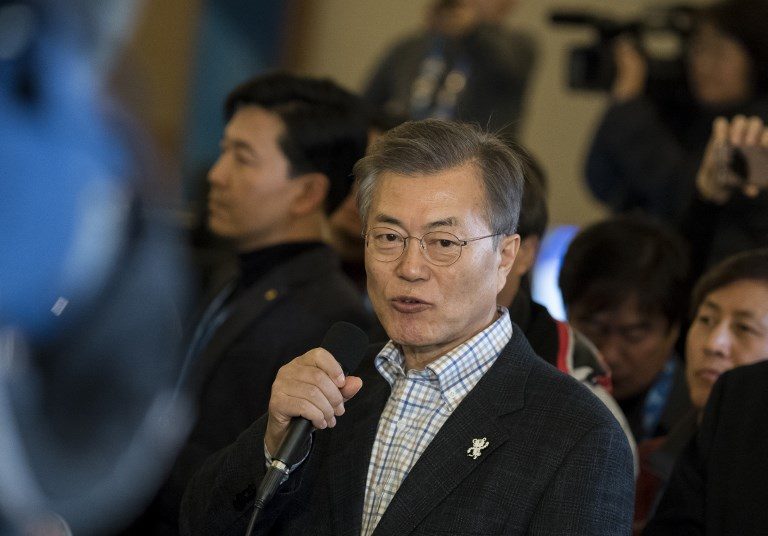SUMMARY
This is AI generated summarization, which may have errors. For context, always refer to the full article.

SEOUL, South Korea – South Korean President Moon Jae-in struck a conciliatory tone towards Japan on Thursday, August 15, offering to “join hands” if Tokyo chooses dialogue as relations between the US allies dip to fresh lows.
Seoul and Tokyo, both democracies and market economies, are mired in long-running disputes over Japan’s use of forced labor in the 20th century.
The neighbors have been embroiled in a tit-for-tat trade war that saw them remove each other from their lists of trusted trading partners this month, raising concerns over global supply chains.
That came after Tokyo imposed restrictions on exports crucial to tech giants such as Samsung following a series of South Korean court rulings ordering Japanese firms to pay for wartime labor.
But Moon sought to dial down the temperature on Thursday, saying Seoul was willing to work with Tokyo to secure “fair trade and cooperation” in the region.
“If Japan chooses the path of dialogue and cooperation, we will gladly join hands,” Moon said in a speech marking the anniversary of Korea’s liberation from Japan’s 1910-45 rule.
Dressed in a pale gray-blue hanbok, the traditional Korean attire, Moon – who earlier this month vowed his country will “never be defeated again by Japan” – insisted Seoul has “not dwelt on the past”.
“We hope that Japan will play a leading role together in facilitating peace and prosperity in East Asia while it contemplates a past that brought misfortune to its neighboring countries,” Moon said.
At the center of the latest row is the plight of hundreds of thousands of Koreans, conscripted into forced labor by Japan during its 35-year occupation – an issue Tokyo says was settled under the 1965 treaty that re-established diplomatic ties.
On Thursday, thousands of South Koreans – including two victims – marched downtown Seoul in heavy rain, urging sincere apology from Japan.
“It is my wish to hear an apology from Abe before I die,” said Yang Geum-deuk, now in her 90s, surrounded by placards that read “No Abe” and “Compensate forced laborers”.
‘Unification by 2045’
The dispute has raised concerns over the US allies’ security cooperations in the face of a series of North Korean missile tests in recent weeks.
Pyongyang and Washington are engaged in a long-running diplomatic process over the North’s nuclear and missile programs, but despite 3 unprecedented meetings, little progress has been made on denuclearization.
Moon played down North Korea’s recent tests – following US President Donald Trump’s example – as he assured Seoul had “even stronger” defense capabilities, and was working to prevent an escalation of tensions.
“The ultimate goal that these actions serve is dialogue, not confrontation,” he added.
Moon pledged Thursday that he will “solidify the foundation” with the goal of “achieving peace and unification by 2045,” although his single five-year term presidency ends in 2022.
But analyst Shin Beom-chul at the Asan Institute for Policy Studies called Moon’s claim “meaningless,” saying it will be difficult to generate a “consensus” given the current climate of inter-Korean ties.
Pyongyang has recently rebuffed Seoul, saying nuclear talks will be “strictly” between the North and the US, and refusing to hold separate dialogue with the South.
Moon – who has long favored dialogue with the North – has dangled cross-border economic cooperation as incentives, but proposed projects are blocked under several sets of sanctions over the North’s weapons programs. – Rappler.com
Add a comment
How does this make you feel?
There are no comments yet. Add your comment to start the conversation.